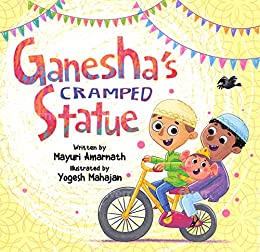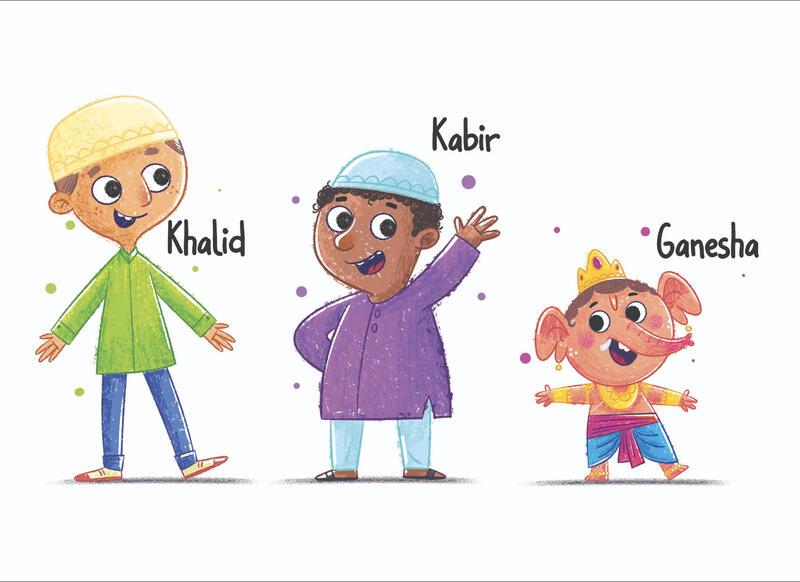
With its bold and colorful illustrations, Ganesha’s Cramped Statue is a delightful way for children of all ages to learn about Indian culture and appreciate its grand festivals.
It is Ganesh Chaturthi and Ganesha, the elephant-headed Indian God, is so excited. It is his birthday and believers from all around the world will celebrate him for 10 whole days. There will be prayers, delicious food, and special yummy laddus made just for him. It is a huge festival and every year he parties with his devotees by going down to earth and living in one of his biggest, most lavish statues.
This year is no different. Ganesha is all set to go down to earth to bask in the glory of people’s admiration. He jumps into the river Sarasvati. But wait. What just happened? He is stuck. This is not the best statue on earth. He is stuck in a dingy, cramped statue. How is he going to get out?
In this fresh take on Ganesha Chaturthi, Ganesha, the Remover of Obstacles, has to overcome his own obstacles with the help of his new friends Khalid and Kabir.

I received a complimentary copy of this book from Reedsy Discovery. I voluntarily chose to read and post an honest review.
Did you know Ganesha is an elephant-headed Indian God? I didn’t, and I know this will be new information for many children and adults (like myself) too. The image of the Indian God will amaze young readers because Ganesh not only has the head of an elephant, but he also stands upright and has 12 arms (page 3).
In Ganesha’s Cramped Statue by Mayuri Amarnath, it’s festival season, and millions of people travel and pray to the Indian God while eagerly awaiting his appearance. They are optimistic that the god’s spirit will land in the 50-foot statue that honors him yearly. Ganesha was looking forward to the week-long festival, powering up from his worshippers because, without their prayers, he won’t have the strength to rejoin his body. However, things didn’t go as planned. Poor Ganesha’s spirit didn’t get inside the enormous statue of the temple.
Some text on pages 15 and 16 was difficult to read due to its placement and color compared to the background color. Some words were written on the window trim, making them nearly impossible to read on the file. There were also words used in the story that I was unfamiliar with and weren’t clearly illustrated: laddu and biryani. I had to look up those two words and mandap. I’m assuming the author wants all children worldwide to read this, so they need to explain and illustrate sections, so those not in that culture understand what the foreign words mean.
The illustrations showed Ganesha with twelve arms and later on four. This confused me, so I did a bit of research. I discovered that the god is typically seen with four but can have many more. While the information after the story about Ganesha Chaturthi was informative, I wanted to know more about the festival. I discovered that the festival date varies. This year it happened in August, and next year it’s projected to occur in September.
Learning about other cultures is important, so parents and educators should share this book with their children and class.
Heart Rating System:
1 (lowest) and 5 (highest)
Score: ❤❤❤
Meet the Author

Mayuri Amarnath is an Aerospace Engineer by education, a teacher by profession, and an author at heart. She grew up in a traditional South Indian family and now writes stories about Hindu Gods and their festivals. Her stories bring a new perspective to these ancient celebrations.
![]()
